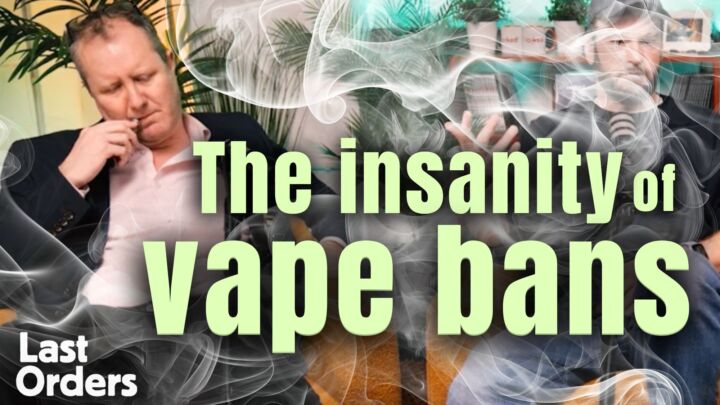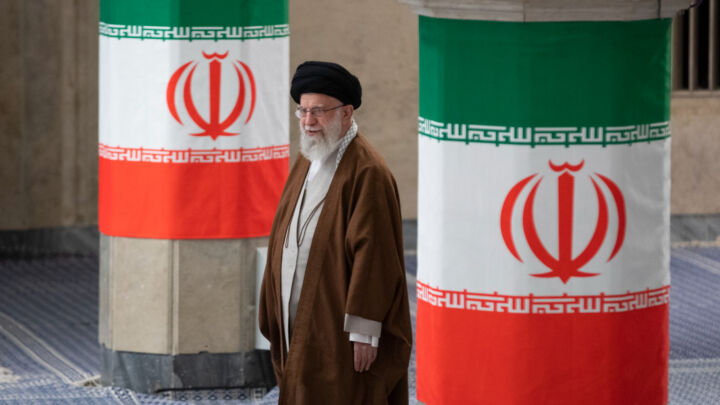There is an alternative
Brexit and other populist revolts create the space for a new politics.

Want unlimited, ad-free access? Become a spiked supporter.
Something is in the air. Rising numbers of intelligent people realise that public life in Western societies cannot carry on in the old way. Politics has been running on empty for some time — and this has now become evident to many people, who can see that the institutions and conventions of Western politics have become exhausted to the point that they can no longer make sense of the realities confronting 21st-century society.
Until recently, the decline of traditional loyalties and party affiliations, and the loss of any cohering political language, did not matter a great deal. Establishment institutions and mainstream political parties could, for the most part, get by through cultivating and relying on the passivity of the electorate. In the era of TINA (There Is No Alternative), a sense of fatalism meant that political life could chug along, despite the erosion of trust in public institutions and the hollowing out of party politics.
The resilience of TINA was underpinned by the exhaustion of the political imagination. There really was no alternative, for the simple reason that parties and interest groups could not think of one. Instead of engaging with the challenge of developing political alternatives, many opted to engage in branding exercises instead. Think-tanks and political parties invented new slogans and came out with ‘Big Ideas’. But these turned out to be shallow public-relations initiatives, which relied on branding and spin rather than being rooted in the real experience of civic society.
Throughout the Western world, the holders of power responded to the crisis of meaning and legitimacy in political life by outsourcing their authority to apparently neutral expert institutions. Decisions which historically had fallen under the purview of elected representatives were being depoliticised and delegated to courts, national banks, NGOs, and transnational institutions like the European Union. This juridification and depoliticisation of public life could be seen in the rise of technocratic language. The vocabulary of ‘adding value’, ‘best practice’, ‘sustainability’ and ‘evidence-based policy’ came to displace language grounded in political ideals. Parties of all persuasions embraced TINA and the technocratic turn, meaning the historical distinction between left and right ceased to have much significance.
The fatalistic zeitgeist of TINA created a climate in which mistrust and cynicism could flourish. This climate was hospitable to the evolution of two important trends: the politics of identity, and anti-politics.
One of the first casualties of the unravelling of the postwar political set-up was the value accorded to the West’s historical traditions and ways of life. Traditional values seemed to be exposed, and many of the conventions associated with them — family, marriage, deference, relations between genders — became vulnerable to criticism. Political elites became less and less capable of defending the values that were central to socialisation in Western society. Some of these values — such as the worship of hierarchy, and patriarchal and paternalistic practices — were well worth challenging. But it wasn’t only stifling and oppressive practices that were put to question; the values of loyalty, sovereignty, tolerance and liberty also came to be considered outdated outlooks, now of dubious value.
Among sections of the former left, the vulnerability of the traditional establishment to criticism seemed like an opportunity to recoup some of the influence they had lost. It was at this point, mainly in the late Seventies and early Eighties, that we witnessed the cultural turn of the left. It replaced the politics of class with the politics of cultural identity, at a time when challenging traditional values was akin to kicking against an open door.
Identity politics could thrive because, in this fatalistic climate where old ideals appeared threadbare, nothing seemed to be beyond question. However, questioning soon mutated into cynicism about the very attempt to uphold moral norms. The idea that no ideals could have universal relevance, and that claims to truth should be treated with suspicion, started to take hold. This relativism and cynicism over traditional loyalties encouraged individuation and the segmentation of public life. This was expressed most clearly in the politics of lifestyle and identity.
The more the politics of identity took hold, the more politics itself, in its traditional meaning, came to be viewed with disdain. The dominant form of opposition to those in power came to be anti-politics. Practitioners of anti-politics tend to disparage the character of politicians, and their motives. Over the years, playing the anti-politics card helped Ronald Reagan and Silvio Berlusconi become leaders of their countries. Donald Trump, who says he is not a politician, is one of the most consummate representatives of anti-politics. Anti-politics assumes a variety of forms: supporters of Trump will implicitly agree with something like the Occupy movement on at least one point — that politicians cannot be trusted.
It is tempting to think that anti-politics offers a positive alternative to an exhausted, self-serving political establishment. In fact, it merely offers a negative critique of the status quo. Anti-politics is not directed at a particular party or interest but at the very idea of politics. Its premise is that politics as such is futile. It is sceptical of the capacity of citizens to achieve positive results through political mobilisation. It doesn’t only criticise politicians — it indirectly attacks representative democracy and the citizens who operate within it.
Virtually no one has anything positive to say about politics or politicians. Taking cheap shots at corrupt politicians guarantees a standing ovation. The radical supporters of anti-politics overlook that the flipside of anti-politics is TINA — an acceptance of the world as it is. For without politics people are reduced to passive objects, shaped by fate.
Finally, after almost four decades of being in the ascendant, TINA has been forced on to the defensive by recent events and electoral results. The discussions at the recent meeting of the World Economic Forum (WEF) in Davos confirmed that the global advocates of TINA feel deeply troubled right now. ‘Davos Man’ understands that his cosmopolitan technocratic values have become discredited, and that invoking the mantra of TINA will not win the argument anymore.
‘Davos Man’ tries to explain away the rejection of his values by talking about a revolt of ‘angry populists’. He hopes this is just a blip and it will be remedied once the ‘left behind’ are provided with a few economic benefits. Modifying ‘market fundamentalism’ with a bit of economic redistribution is seen as a possible remedy for the populist malaise.
What the WEF has failed to grasp is that it isn’t economic precariousness that has encouraged people to reject their political representatives — it’s cultural insecurity. Throughout the West, a growing section of the public has come to the conclusion that the political elite’s values are not values that they share. In making this decision, and taking steps to express it at the ballot box, people have started to countenance the possibility that there is an alternative.
It is important not to confuse this expression of public opposition to the political and cultural establishments with the parties and leaders that have sought to harness such public opposition. Most of these leaders are actually still captive to the political culture they seek to oppose. Consider the rhetoric and political style of Trump. His populist reputation notwithstanding, he doesn’t seem to rate very highly the potential of ordinary people to control their destinies. Indeed, Trump, like the political class he criticises, seeks to utilise the politics of victimhood. His speeches are peppered with comments about how the people of America are ‘hurting’, and are the victims of various threats to their very existence. In his inauguration speech, he said ‘this American carnage stops right here and right now’, drawing attention to his own victimhood fantasies.
Trump has become well-known for his criticism of political correctness. But he shares with the practitioners of PC a reverence for the ideal of victim politics. Identity politics tends to divide everyone into groups of victims. Trump seems to want to treat all Americans as victims. Commenting on the controversy over Hillary Clinton’s private email server a few months ago, he said ‘she is not the victim, the American people are the victims’. His inaugural speech depicted America as almost the biggest victim in world politics. As the Wall Street Journal said: ‘Mr Trump sometimes makes the US seem like a victim of an unworthy and hostile world.’
Whatever Trump’s intentions, he is unlikely to offer an alternative to the existing establishment. Like many of Europe’s anti-establishment parties, he is too steeped in the political culture of the past to do much more than react against some of its more grotesque manifestations. Often such movements adopt an immature political rhetoric that is a right-wing mirror image of their leftist opponents. They mimic the performance of rage they see in their identity-politics foes. Worse, they more than match the illiberal temper of the cultural elites with their own brand of revanchist illiberalism. They cannot be trusted anymore than the campus censor to protect hard-won liberties.
Political clarity is lagging behind the demands of the moment. Such clarity is more necessary than ever, given that the populist ethos has emboldened millions to reject the values of those in authority. The vote for Brexit represents an important turn in European public life; it opens up the space for a return of politics. Throughout the West, more and more people have decided to vote in accordance with what they intuitively grasp to be in their community’s best interests rather than caving into the mantra of TINA. That they put more trust in their own intuition and the opinions of their friends and workmates than they do in the advice of opinionated experts indicates that they have started to take their role as citizens seriously. Despite all the social and political pressure, millions rejected the script handed down to them and decided to vote for Brexit. In the context of almost four decades of TINA, that was no mean feat.
What is needed now is a turn away from the divisive politics of cultural identity towards the democratic and liberal values of the Enlightenment. Such a politics should encourage identification with popular and national sovereignty rather than with sub-cultures and lifestyle groups. The healthy populist impulse that has recently emerged should be developed into a conviction that being a citizen matters.
Politics is struggling to return home. Tragically, the dominant cultural institutions — schools, universities, popular culture, the media — are wedded to the old ways and regard the popular rejection of their values with dread. They have a monopoly on the production of knowledge, and the socialisation of young people. Though they feel beleaguered and on the defensive, the fact is that they have greater cultural authority than the countercultural populist movements. As long as their ideas remain dominant — especially over younger generations — the present regime of technocratic governance will continue. We need a battle of ideas for liberty, democracy and tolerance. We need to say there is an alternative. If we take our liberty seriously, open our minds to new possibilities, and educate ourselves to be worthy of the cultural battles to come, then we can build on the populist revolts against TINA.
Frank Furedi is a sociologist and commentator. His latest book, What’s Happened To The University?: A Sociological Exploration of its Infantilisation, is published by Routledge. (buy this book from Amazon(UK)).
Picture by: James Cridland, published under a creative-commons license.
You’ve hit your monthly free article limit.
Support spiked and get unlimited access.
Support spiked and get unlimited access
spiked is funded by readers like you. Only 0.1% of regular readers currently support us. If just 1% did, we could grow our team and step up the fight for free speech and democracy.
Become a spiked supporter and enjoy unlimited, ad-free access, bonus content and exclusive events – while helping to keep independent journalism alive.
Monthly support makes the biggest difference. Thank you.











Comments
Want to join the conversation?
Only spiked supporters and patrons, who donate regularly to us, can comment on our articles.